1. Improving Children's Learning
Myanmar: The Project for Curriculum Reform at Primary Level of Basic Education
Support for the development of primary school textbooks and teacher guides in 10 subjects
In Myanmar, the child-centered teaching approach has been applied across the education sector. However, the lessons that are being conducted on most subjects are still based on outdated textbooks that were compiled under military rule nearly 20 years ago. Achievement tests continue to be designed to assess pupils' memorization skills, rather than their actual ability, and the learning environment still does not encourage pupils to be able to study on their own accord.
Following the country's transition to civilian rule in 2011, Myanmar's Ministry of Education embarked on several comprehensive institutional reforms that encompass changes to curricula, textbooks, pre-service and in-service teacher training, and achievement tests (assessment). JICA has provided integrated assistance to these efforts, which involve developing textbooks for all primary school grades 1-5 in 10 subjects-Myanmar, English, mathematics, science, social studies, morality and civics, life skills, physical education, performing arts, and visual arts, as well as developing teacher guides for these textbooks, and providing an offering of teacher induction trainings, in addition to pre-service training at Education Colleges.
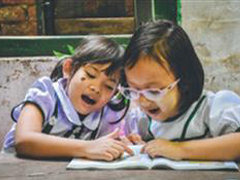
Students' academic curiosity is heightened under the new curricula
For the academic year starting June 2017, the first grade students' textbooks and associated teacher guides, which were developed with the assistance of JICA, were distributed to 1.3 million pupils and 60,000 teachers across the country. By 2021, all primary school textbooks and corresponding teacher guides will be developed for each of the grades, and these new textbooks are anticipated to encourage pupils across the country to garner the skills necessary to think critically and solve problems on their own.
- Primary Schools in Myanmar Start Using New Textbooks: Children Excited About Colorful Textbooks, Speak Up More in Class (News, July 27, 2017)
Niger and Madagascar: "School for All" a project to support educational development through community participation
"School for All":Improving children's learning through collaboration among parents, communities and schools.
The "School for All" project began in Niger in 2004 with the aim to improve the quality and access of children's education through the active participation of parents, teachers and communities. The project has now reached 18,000 schools across Niger and has spread to around 40,000 schools across Africa [1] . There are three main components of the "School for All" project: (1) the establishment of a school management committee that is open to the public with democratic leadership based on secret ballot elections that have taken place during a community general assembly; (2) the creation of a school action plan through discussions at a community general assembly about the results of basic literacy and numeracy assessments, as well as decisions on how to implement the plan based on voluntary contributions; (3) the establishment of a monitoring and support system to create accountability to achieve the school action plan.
While the primary school enrollment rate has steadily increased in Sub-Saharan Africa in recent years, with now 138 million, or nearly nine out of ten primary school-aged children enrolled in school, many are still not attaining minimum reading and mathematical proficiency levels (UNESCO Institute for Statistics 2017). As the population is rapidly growing in the region, the quality of education may decline and the number of grade repetitions and dropouts among students may increase further in the future.
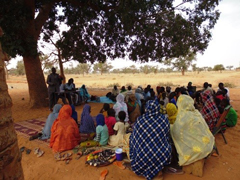
A gathering during a Community General Assembly to improve school activities
The "School for All" project is currently working on developing an innovative model to improve the quality of children's learning in Niger and Madagascar by improving collaboration between parents, teachers and communities. JICA is partnering with international organizations like the World Bank and the India-based NGO, Pratham, to develop and scale up this model. So far, the model has improved the literacy and numeracy skills of children, and the numeracy component of this model is currently being scaled up to reach around 300,000 children at 3,500 schools. JICA plans to continue improving and expanding this model across Africa to improve children's learning.
Note
[1] Senegal, Burkina Faso, Mali, Côte d'Ivoire, Madagascar
Egypt: Egypt-Japan Education Partnership (EJEP)
Installing Japanese-style Education in Egypt
While approximately half of Egypt's total population of 93 million is under age 25, the youth unemployment rate in the country is at 42 percent (World Bank, 2014). This is believed to be caused in part by the Egyptian uprising of 2011, showcasing the need for capacity development for Egyptian youth to help eliminate unemployment, as well as ensure the country's stability.
By valuing and viewing the Japanese people's diligence, discipline, and cooperativeness as aligned with the teachings of the Qur'an (the Islamic religious text), the President of Egypt Abdel Fattah el-Sisi requested Japan's support to implement human resource development efforts in his country.
During the President's visit to Japan in February 2016, the Egypt-Japan Education Partnership (EJEP) was established between the two countries. Through this agreement, JICA has extended its support under two primary objectives. On one hand, JICA is focusing on improving student discipline and cooperation in basic education, rather than just on student academic achievement. In this regard, JICA is introducing new practices to students like cleaning classrooms, conducting class meetings, and other Tokkatsu (special activities) that are typical features of Japanese education. On the other hand, JICA is providing comprehensive, intensive support, in addition to financial assistance, by sending Japanese specialists to Egypt for all grades.
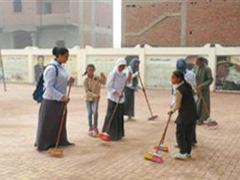
Students at a Giza Primary School sweep school grounds. These maintenance and management activities provide valuable lessons on how to live with others and work cooperatively.
Through the support that JICA provides based on Japan's strengths, the capacity of Egyptian youth is expected to improve and contribute to the stabilization and development of not only Egypt, but the entire Middle East.
The Project for Quality Improvement of Early Childhood Development
- ‘Learning through Playing' to Egypt for the Development of Physical and Intellectual Ability (News, January 4, 2018)
The Project for Creating Environment for Quality Learning
- Japanese-Style Education-"Special Activities" /Tokubetsukatsudo(Tokkatsu)-Spreads to Egyptian Elementary Schools (News, January 10, 2017)
The Project for Egypt-Japan University of Science and Technology Phase 2
2. Developing Human Resources to Enhance Innovation and Industry
Asia (ASEAN):ASEAN University Network / Southeast Asia Engineering Education Development Network (AUN/SEED-Net) Project Phase 3
The fourth phase of AUN/SEED-Net aims to further enhance educational and research collaborations between ASEAN countries and Japan.
Launched in 2001, SEED-Net has provided support to 26 leading engineering universities ("member institutes (MIs)") in 10 ASEAN countries with the cooperation of 14 Japanese Supporting Universities(JSUs).
Support by SEED-Net have included efforts like education capacity building through graduate programs that enable academic staff to obtain advanced degrees; collaborative research programs to improve research skills; a new academic network created through regional conferences; and the publication of a new ASEAN Engineering Journal. So far, approximately 1,400 teaching staff have received scholarships and more than 200 collaborative research activities have been conducted through the project.
Now in its fourth phase, the project is beginning new measures to enable MIs to develop appropriate educational and research activities according to current circumstances in the ASEAN. It is expected that the new measures lead to solutions for cutting-edge social issues. More specifically, the project will help establish a new international collaborative education program where MIs and JSUs pool their strengths to develop human resources and support stronger partnerships between MIs and ASEAN industries through internships, collaborative research, among other efforts. Through this and other ventures, AUN/SEED-Net will continue to play a vital role in enhancing the engineering capacity across the region.
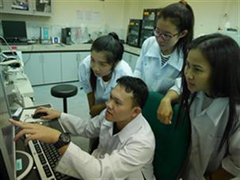
UTM students from Thailand, Cambodia, and Myanmar
- AUN/SEED-Net Project Page
- The signing of the Cooperative Framework on Technical Cooperation Project with ASEAN: Contributing to the development of advanced engineering human resources to support ASEAN development
AFRICA -ai- JAPAN Project: African Union - African innovation - JKUAT AND PAUSTI Network Project
Developing human resources in the area of STI for Africa through African Innovation
In 2008, the African Union Commission (AUC) launched a plan to establish the Pan African University (PAU) to raise the capacity of higher education institutions by enhancing human resources to better enable Africa's social and economic development. Afterwards, in 2012, PAUSTI, one of the five institutes comprising the PAU, was established on the campus of the Jomo Kenyatta University of Agriculture & Technology (JKUAT). Since June 2014, Japan began providing technical support to PAUSTI by promoting STI activities at JKUAT under the AFRICAN UNION - African innovation - JKUAT AND PAUSTI NETWORK PROJECT (AFRICA - ai - JAPAN PROJECT) at the request of the Government of Kenya and based on an agreement signed between the AUC and Japan.
By January 2018, 474 people from 40 African countries have enrolled in the Ph.D. or M.Sc. programs at PAUSTI. Of those, 96 of them have already graduated and received their Master's degrees, showcasing how PAUSTI has contributed in the development of highly-skilled professionals across Africa. Additionally, the first PAUSTI Ph.D. graduate - the first among the five PAU institutions - will graduate in June 2018. In this way, PAUSTI plans to continue developing highly skilled professionals who will promote industry and social development across Africa.
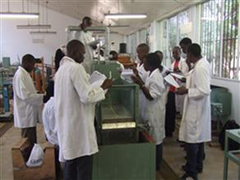
A hydraulic experiment conducted at the School of Civil, Environment and Geospatial Engineering of JKUAT
Vietnam: Project for the Establishment of the Master Programs of Vietnam-Japan University
Developing Global Talent under Japan and Vietnam's Partnership
With the support of the Government of Vietnam and the Government of Japan, the project to establish the Vietnam-Japan University was launched in an effort to produce global talent who can serve as a bridge between the two countries. Since then, JICA has provided assistance to create the university's master's programs, which launched in September 2016.
"A Graduate School that Cuts Across the Humanities and Sciences to Develop Human Resources that have Wider Horizons"
In order to achieve sustainable development in a society, it is necessary to develop strong professionals that have wide horizons who can find solutions to social issues that are increasingly sophisticated and complex. By focusing on sustainability science, Vietnam-Japan University (VJU) offers six types of master's programs: (1) area studies; (2) public policy; (3) business administration; (4) environmental engineering; (5) nanotechnology; (6) infrastructure engineering. Students take courses in their specialized fields, in addition to courses in both the humanities and sciences in a cross-sectoral manner. By offering Japanese language education and internships in Japan, VJU also works to produce talented students who can succeed in a Japanese business environment. In the future, VJU hopes to further open its doors to accept more students from Asia, and from other parts of the world, to equip them with skill-sets necessary to work internationally.
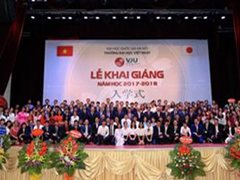
VJU Welcome Ceremony, September 2017
In April 2016, Dr. Motoo Furuta, a University of Tokyo professor emeritus, was appointed the first rector of VJU. In the years ahead, JICA will continue to work with Japanese universities to further assist VJU in improving its curricula.
* The listed programs reflect the 2017 academic year. From the AY 2018, VJU will offer new programs, including climate change, global leadership, and other disciplines.
- Vietnam-Japan University Opens With Aim of Providing World-Class Human Resources (News, October 4, 2016)
Uganda: TVET-Leading Institution's Expansion of Human Resource and Skilled Workforce Development for Industrial Sector in Uganda (TEVET-Lead Project)
Creating a Mutually Beneficial Partnership with Uganda's Private Sector
Uganda's rapidly growing economy has attracted significant foreign direct investment from private businesses who are hoping to develop new opportunities, particularly in construction and manufacturing. However, since there is a limited number of skilled human resources in Uganda, the country's business, technical, vocational education and training (BTVET) institutions often fail to match the human development capacity required to meet the private sector's needs. While most highly-paid technical jobs tend to be occupied by foreign workers, many of the country's vulnerable populations, including women and people with disabilities, are excluded from capacity-building and employment opportunities. Given these circumstances, the Government of Uganda has requested the Government of Japan to support its efforts to transform the Nakawa Vocational Training Institute (NVTI) into a college level training institution through a technical cooperation project. Originally, the NVTI was established in 1971 under the "Uganda Vocational Training Center Project (1968-1974)," which was one of JICA's earliest vocational training initiatives in Africa.
Through this project, the NVTI aims to enhance its collaboration with the private sector to design more practical training courses, improve its employment-oriented vocational training management system, as well as disseminate its experience to Uganda's other BTVET institutions.
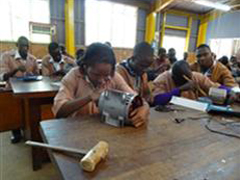
Electrical Department: Female student practices winding coil
Senegal: Project for improving Organizational Capacity of Technical and Vocational Training Center Senegal-Japan
Developing the Soft-Skills Necessary to Meet Rapidly Expanding Industry Demands
Since the establishment of the Senegal-Japan Vocational Training Center (CFPT) in 1984, JICA has supported the development of Senegal's industrial human resources for over 30 years. In Senegal's labor market, demand for industrial human resources has rapidly increased, while a shortage of people with these skills continue to persist. CFPT was established at the behest of the Government of Senegal to respond to the country's changing industrial needs due to its economic growth, while also being expected to serve as a role model for the country's other vocational training centers.
In February 2017, the fourth technical cooperation project for CFPT was launched, dubbed "The Project for Improving Organizational Capacity of Technical and Vocational Training Center Senegal-Japan." The project focuses on improving ongoing institutional functions based on the PDCA cycle, as well as continuing the development of instructors' skill-sets and improving the curriculum. Through this project, the management capacity at CFPT has been particularly strengthened.
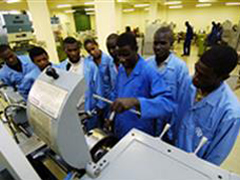
Trainees at CFPT
In October 2017, the principal of CFPT and other counterparts visited Japan to attend a special training course that provided lectures and field visits to exemplify practical management skills and Japanese work-ethic concepts such as "5S" (sort, set, shine, standardize, and sustain) to replicate back in their home countries.
By adopting Japanese ideologies like "5S," CFPT hopes to enhance the employability of Senegal's population by fostering more professionals who are equipped with the skills necessary to be hired by foreign companies, including Japanese businesses (the unemployment rate in Senegal is currently over 10 percent).
- South-South and Triangular Cooperation: Support by Senegal's Vocational Training Center to French-speaking African countries
3. Building Inclusive, Peaceful Societies Through Education
The Project for Strengthening Teachers Ability and Reasonable Treatments for Children with Disability (START)
Improving Mongolia's access and quality of education for children with disabilities
In Mongolia, many children with disabilities (CWDs) are not able to receive developmental support and education in accordance with the child's needs. This is due to a lack of adequate systems that enable early detection of developmental abnormalities. In addition, even if a disability is detected early on, many CWDs never gain access to the forms of education that suit their needs. Therefore, they often face difficulties in even enrolling into primary schools.
This project, in collaboration with The Ministry of Education, Culture, Science, and Sports, aims to strengthen the early detection and intervention of CWDs. It also implements pilot activities to improve the capacity of teachers and other stakeholders to enable better support for CWDs. Through these efforts, the project aims to improve the access and quality of education that children with disabilities in Mongolia receive.
In order to improve education access, the project develops assessment tools to accurately detect CWDs' educational needs and a supporting system that complements the child's development at different stages of their life, from infancy to adolescence. To improve Mongolian teachers' abilities to provide quality education to their students with intellectual disabilities, the project implements capacity building programs for educators who teach in Ulaanbaatar's special needs or general schools with opportunities like technical trainings in Mongolia and Japan. The knowledge gained through these activities will then be incorporated into Mongolia's educational system through knowledge-sharing seminars or reforms to the school's curriculum.
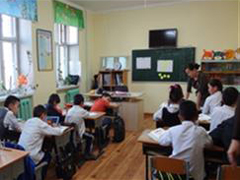
Children with intellectual disabilities learning at a Special Needs School
Through this project, the familiarity and receptiveness of "living together" (co-existence) with people with disabilities is anticipated to be increased nationwide. Therefore, more and more children with disabilities will be able to attend schools in Mongolia, which are currently striving to implement inclusive education practices.
- START project page




scroll